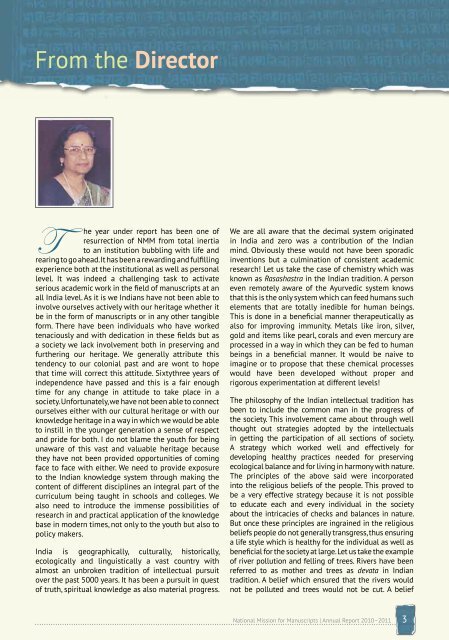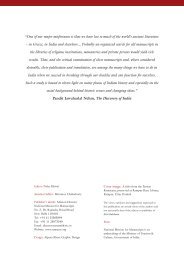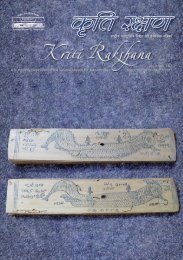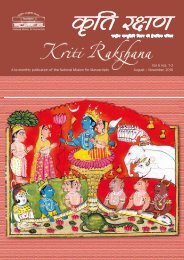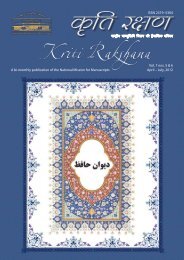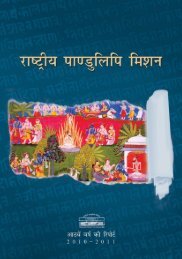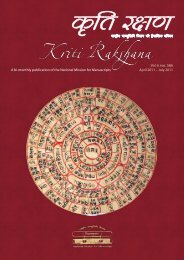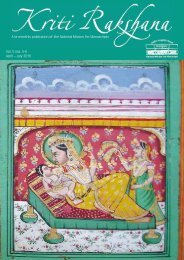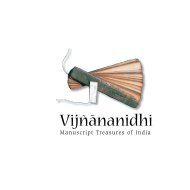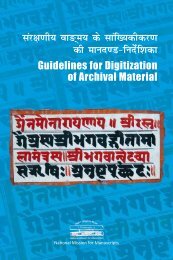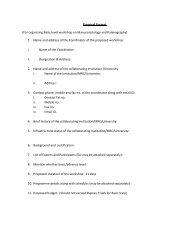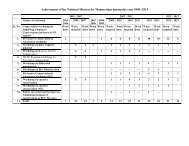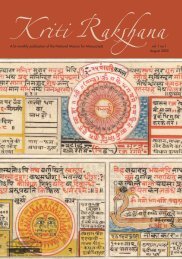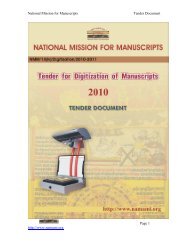English - National Mission for Manuscripts
English - National Mission for Manuscripts
English - National Mission for Manuscripts
Create successful ePaper yourself
Turn your PDF publications into a flip-book with our unique Google optimized e-Paper software.
From the DirectorThe year under report has been one ofresurrection of NMM from total inertiato an institution bubbling with life andrearing to go ahead. It has been a rewarding and fulfillingexperience both at the institutional as well as personallevel. It was indeed a challenging task to activateserious academic work in the field of manuscripts at anall India level. As it is we Indians have not been able toinvolve ourselves actively with our heritage whether itbe in the <strong>for</strong>m of manuscripts or in any other tangible<strong>for</strong>m. There have been individuals who have workedtenaciously and with dedication in these fields but asa society we lack involvement both in preserving andfurthering our heritage. We generally attribute thistendency to our colonial past and are wont to hopethat time will correct this attitude. Sixtythree years ofindependence have passed and this is a fair enoughtime <strong>for</strong> any change in attitude to take place in asociety. Un<strong>for</strong>tunately, we have not been able to connectourselves either with our cultural heritage or with ourknowledge heritage in a way in which we would be ableto instill in the younger generation a sense of respectand pride <strong>for</strong> both. I do not blame the youth <strong>for</strong> beingunaware of this vast and valuable heritage becausethey have not been provided opportunities of comingface to face with either. We need to provide exposureto the Indian knowledge system through making thecontent of different disciplines an integral part of thecurriculum being taught in schools and colleges. Wealso need to introduce the immense possibilities ofresearch in and practical application of the knowledgebase in modern times, not only to the youth but also topolicy makers.India is geographically, culturally, historically,ecologically and linguistically a vast country withalmost an unbroken tradition of intellectual pursuitover the past 5000 years. It has been a pursuit in questof truth, spiritual knowledge as also material progress.We are all aware that the decimal system originatedin India and zero was a contribution of the Indianmind. Obviously these would not have been sporadicinventions but a culmination of consistent academicresearch! Let us take the case of chemistry which wasknown as Rasashastra in the Indian tradition. A personeven remotely aware of the Ayurvedic system knowsthat this is the only system which can feed humans suchelements that are totally inedible <strong>for</strong> human beings.This is done in a beneficial manner therapeutically asalso <strong>for</strong> improving immunity. Metals like iron, silver,gold and items like pearl, corals and even mercury areprocessed in a way in which they can be fed to humanbeings in a beneficial manner. It would be naive toimagine or to propose that these chemical processeswould have been developed without proper andrigorous experimentation at different levels!The philosophy of the Indian intellectual tradition hasbeen to include the common man in the progress ofthe society. This involvement came about through wellthought out strategies adopted by the intellectualsin getting the participation of all sections of society.A strategy which worked well and effectively <strong>for</strong>developing healthy practices needed <strong>for</strong> preservingecological balance and <strong>for</strong> living in harmony with nature.The principles of the above said were incorporatedinto the religious beliefs of the people. This proved tobe a very effective strategy because it is not possibleto educate each and every individual in the societyabout the intricacies of checks and balances in nature.But once these principles are ingrained in the religiousbeliefs people do not generally transgress, thus ensuringa life style which is healthy <strong>for</strong> the individual as well asbeneficial <strong>for</strong> the society at large. Let us take the exampleof river pollution and felling of trees. Rivers have beenreferred to as mother and trees as devata in Indiantradition. A belief which ensured that the rivers wouldnot be polluted and trees would not be cut. A belief<strong>National</strong> <strong>Mission</strong> <strong>for</strong> <strong>Manuscripts</strong> | Annual Report 2010–2011


